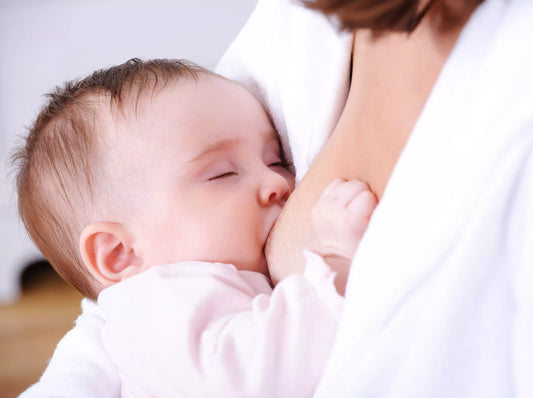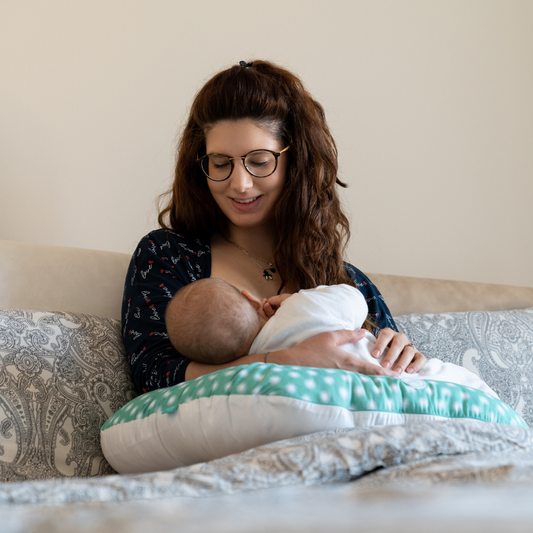What happens if you become pregnant while still breastfeeding your first baby? Can I continue nursing while pregnant? This particular situation can often be confusing, especially as you’ll find lots of people advise you to stop breastfeeding, based more on traditional beliefs than actual scientific grounds.
The short answer, however, is yes! It is indeed possible to breastfeed during pregnancy, however there are some important factors to keep in mind.
Pregnant and nursing, why you can
"For as long as mum and baby both want to", is the foundation of breastfeeding, which also applies if you are expecting another baby.
Latest studies have shown that there’s no link between miscarriage and breastfeeding.
Can breastfeeding cause labour?
It was once believed that breastfeeding could induce early labour because nipple stimulation produces oxytocin, the hormone which causes labour.
However, a study carried out by Kimura et in 1996 showed that not even a high dose of synthetic oxytocin (Pitocin) can induce labour before pregnancy reaches full term.
It’s also important to keep in mind that the amount of hormone produced during a feed is similar to the amount produced during sexual intercourse, and sex usually isn’t forbidden during the nine months of pregnancy.
This doesn’t exclude a few specific cases, such as the mum suffering from malnutrition or problems with foetal growth, in which cases you’ll be advised to stop breastfeeding. Your doctor will offer guidance in these situations.

WHO advice on being pregnant while nursing
What does the World Health Organisation advise on breastfeeding while pregnant?
The general WHO guidelines on breastfeeding are to breastfeed exclusively for the first six months of your baby’s life, and then it recommends continuing with breastfeeding, supplementing it with solid foods, until at least your child reaches two years of age, or for as long as mum and child wish.
This applies even if a new pregnancy occurs while you’re nursing. This considers the following evidence:
- There is no documented increased risk of miscarriage from breastfeeding during pregnancy.
- There is no documented evidence that breastfeeding can trigger uterine contractions and lead to pre-term labour.
- In an industrialised country like Italy, where pregnant women are generally healthy and well-nourished, there’s no increased risk of intrauterine growth retardation or maternal malnutrition.
Is it safe to breastfeed while pregnant?
As we’ve said, there’s no link between breastfeeding and miscarriage, just as there’s no link between breastfeeding and labour.
What are the contraindications then of breastfeeding in pregnancy?
You may feel tired.
Being pregnant and nursing a baby or toddler are both demanding activities even when done individually, so it’s even more important to take care of yourself, resting when you can and eating a healthy, balanced diet in order to ensure you have plenty of energy.
You don’t have to eat for three! Just make sure you have the correct calorie intake, and consume fruit and vegetables regularly. And above all, listen to and follow what your body’s telling you: if you’re feeling hungrier, then eat! Obviously without gorging on crisps or chocolate!
Breast milk can undergo a change in composition and quantity.
Changes in your milk composition may occur such as a decrease in milk production, which are linked to the needs of your new baby towards the end of pregnancy. This change in taste in your milk may result in some toddlers losing interest in their mum’s breast.
By the end of your pregnancy your baby or toddler will already be well over 6 months old, and will therefore have already started feeding on solid foods.
What if I don't want to continue breastfeeding during pregnancy?
In this article we’ve talked about why you can continue nursing your baby or toddler even during a second pregnancy, this, however, does not mean that you should. It’s a personal decision that must always be based on mum's health and well-being, as well as that of her children.
If you think it’s the right time to stop breastfeeding your first child, or that it’s becoming too tiring for you to nurse while carrying your pregnancy, you shouldn’t feel guilty. The golden rule at such delicate times like pregnancy and the post-natal period is always to follow your own instinct and listen to what your body is telling you.
The information contained in this Site is purely for informative purpose only and in no case does it replace the formulation of a diagnosis or treatment plan by a doctor. We recommend that you always seek the advice of your gp, doctor and/or healthcare specialists.






